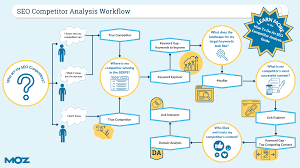Mastering SEO Competitor Analysis: Gaining an Edge in Digital Marketing
The Importance of SEO Competitor Analysis in Your Digital Strategy
When it comes to optimizing your website for search engines, understanding your competitors is key to staying ahead in the digital landscape. SEO competitor analysis is a crucial component of any successful digital marketing strategy.
By conducting a thorough SEO competitor analysis, you can gain valuable insights into what strategies are working for your competitors, identify areas where you can improve, and uncover new opportunities to enhance your own search engine rankings.
What Does SEO Competitor Analysis Involve?
SEO competitor analysis involves researching and analyzing the websites of your competitors to understand their strengths and weaknesses in terms of search engine optimization. This process typically includes:
- Identifying your main competitors in the online space
- Analyzing their website structure and content
- Evaluating their backlink profile and domain authority
- Assessing their keyword strategy and ranking performance
- Monitoring their social media presence and engagement
The Benefits of SEO Competitor Analysis
By conducting regular SEO competitor analysis, you can:
- Gain insights into industry trends and best practices
- Identify new keyword opportunities to target
- Improve your website’s content strategy based on successful tactics used by competitors
- Enhance your link-building efforts by learning from competitor backlink profiles
- Stay ahead of changes in search engine algorithms and adjust your strategy accordingly
In Conclusion
In today’s competitive online environment, staying informed about what your competitors are doing is essential for maintaining a strong presence in search engine results. SEO competitor analysis provides valuable insights that can help you refine your digital marketing strategy, attract more organic traffic, and ultimately achieve better results.
6 Essential Tips for Effective SEO Competitor Analysis
- Identify your main competitors in the industry.
- Analyze their website structure and content.
- Examine their backlink profile to understand their link building strategies.
- Monitor their keyword rankings to identify high-performing keywords.
- Study their social media presence and engagement levels.
- Regularly track and compare your performance metrics against your competitors.
Identify your main competitors in the industry.
To effectively conduct SEO competitor analysis, it is crucial to begin by identifying your main competitors within the industry. By pinpointing who your key competitors are, you can gain a deeper understanding of their strategies, strengths, and weaknesses in the digital landscape. This knowledge allows you to tailor your own SEO efforts more strategically, benchmark your performance against theirs, and uncover opportunities to differentiate your brand in the online space. Identifying your main competitors serves as a foundational step in developing a comprehensive SEO strategy that positions you for success and helps you stay ahead in the competitive digital market.
Analyze their website structure and content.
Analyzing your competitors’ website structure and content is a crucial step in SEO competitor analysis. By examining how they organize their website, the layout of their pages, and the quality of their content, you can gain valuable insights into what strategies are working for them. Understanding their approach can help you identify opportunities to improve your own website structure and content to enhance user experience, increase engagement, and ultimately boost your search engine rankings.
Examine their backlink profile to understand their link building strategies.
To gain a deeper understanding of your competitors’ link building strategies, it is essential to examine their backlink profile. By analyzing the quality and quantity of backlinks pointing to their website, you can uncover valuable insights into the types of websites they are partnering with, the anchor texts they are using, and the overall strength of their link profile. This information can help you identify potential opportunities for building high-quality backlinks to your own site and refine your own link building strategy for improved search engine rankings.
Monitoring your competitors’ keyword rankings is a valuable tip in SEO competitor analysis as it allows you to identify high-performing keywords that are driving traffic to their websites. By tracking which keywords your competitors are ranking well for, you can uncover new keyword opportunities to target in your own content strategy. This insight not only helps you understand the competitive landscape but also enables you to optimize your website for relevant keywords that have the potential to attract more organic traffic and improve your search engine rankings.
To gain a comprehensive understanding of your competitors’ digital strategy, it is crucial to study their social media presence and engagement levels as part of SEO competitor analysis. By analyzing how your competitors utilize social media platforms, the type of content they share, and the level of audience engagement they generate, you can uncover valuable insights that can inform your own social media marketing efforts. Monitoring their social media activity allows you to identify trends, discover effective strategies, and adapt your approach to enhance your online visibility and engagement with your target audience.
It is crucial to regularly track and compare your performance metrics against your competitors as part of SEO competitor analysis. By monitoring key metrics such as keyword rankings, organic traffic, backlink profiles, and social media engagement, you can gain valuable insights into how your website is performing relative to others in your industry. This comparison allows you to identify areas where you excel and areas where you may need improvement, enabling you to adjust your SEO strategy accordingly to stay competitive in the digital landscape.
Tags :
backlink profile,
best practices,
competitors,
content,
content strategy,
digital strategy,
domain authority,
engagement,
industry trends,
keyword opportunities,
keyword strategy,
link-building efforts,
marketing strategy,
optimization,
ranking performance,
search engine algorithms,
search engines,
seo competitor analysis,
social media presence,
website structure

